John Jacob Abel Award in Pharmacology
Andrew C. Kruse, PhD

ASPET is pleased to award Dr. Andrew C. Kruse, PhD from Harvard University, the 2024 John J. Abel Award in Pharmacology. The John J. Abel Award in Pharmacology, named after the founder of ASPET, was established in 1946 to stimulate fundamental research in pharmacology and experimental therapeutics by young investigators.
Dr. Kruse is receiving this award in recognition of his outstanding research contributions to our understanding of the structural basis of membrane protein signaling.
Dr. Kruse began his independent career as an Assistant Professor at Harvard Medical School in 2014. Key research accomplishments include defining the structural basis for agonist action at the angiotensin II type 1 receptor and other G protein-protein coupled receptors, cloning the sigma-2 receptor, and determining the first structure of a tetraspanin protein and showing how it regulates B cell activation. The Kruse lab also developed a single-domain antibody fragment discovery platform. Dr. Kruse is a co-founder of Tectonic Therapeutic, a biotechnology company, and the Institute for Protein Innovation, a non-profit research organization. He has received awards including an Amgen Young Investigator Award (2019), an Alfred P. Sloan Research Fellowship (2017), a Vallee Scholars Award (2016), and an NIH Director’s Early Independence Award (2015). He received B.S. degrees in Mathematics and Biochemistry from the University of Minnesota in 2009, and a PhD in Structural Biology at Stanford University in 2014. Dr. Kruse has been a member of ASPET since 2021.
The award will be presented at the Awards Lunch on May 19, 2024, during the ASPET 2024 Annual Meeting in Arlington, Va. Additionally, Dr. Kruse has been invited to give a lecture during the Online Award Lecture Series, titled "Antibody Fragments as Tools to Interrogate G Protein-coupled Receptor Signaling." His lecture will be held on Wednesday, April 17, 2024, from 1:00 pm - 2:00 pm. Register here for this lecture.
Julius Axelrod Award in Pharmacology
John D. Scott, PhD, FASPET

ASPET is pleased to award Dr. John D. Scott, PhD from the University of Washington, the 2024 Julius Axelrod Award in Pharmacology. The Axelrod Award was established in 1991 to honor the memory of the eminent American pharmacologist who shaped the fields of neuroscience, drug metabolism, and biochemistry and who served as a mentor for numerous eminent pharmacologists around the world.
Dr. Scott is receiving this award in recognition of his outstanding contributions to our understanding of intracellular communication networks that promote specific signal transduction.
John Scott is a world leader in studies of cell signaling and an academic leader in pharmacology. He discovered the family of A-Kinase Anchoring Proteins and showed how they organize cell-signaling pathways in time and space at the molecular and structural levels. He is Professor and Chair of Pharmacology and Edwin Krebs-Hilma Speights Professor of Cell Signaling Cancer Biology at the University of Washington. A native of Scotland, he received his B.Sc. at Heriot-Watt University and his PhD in Biochemistry at the University of Aberdeen. He was a postdoctoral fellow with Nobel Laureates Edwin Krebs and Edmund Fischer at the University of Washington and Assistant Professor of Physiology & Biophysics at the University of California/Irvine. He joined the Vollum Institute of Oregon Health & Science University in 1990 and was appointed Senior Scientist and Investigator of the Howard Hughes Medical Institute in 1997. He moved to the University of Washington in 2008. Dr Scott is a fellow of the Royal Society London, a fellow of the Royal Society of Edinburgh, and a 2020 ASPET fellow. Dr Scott has been a member of ASPET since 1997.
The award will be presented at the Awards Lunch on May 19, 2024, during the ASPET 2024 Annual Meeting in Arlington, Va.
Pharmacia-ASPET Award for Experimental Therapeutics
Katerina Akassoglou, PhD, FASPET
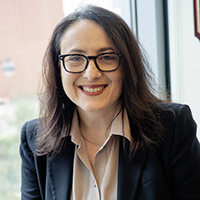
ASPET is pleased to award Dr. Katerina Akassoglou, PhD from the University of California, San Francisco, the 2024 Pharmacia-ASPET Award for Experimental Therapeutics. This award recognizes outstanding research in pharmacology and experimental therapeutics, basic laboratory or clinical research that has had, or potentially will have, a major impact on the pharmacological treatment of disease.
Dr. Akassoglou is receiving this award in recognition of her work on neurovascular and neuroimmune mechanisms that will have a major impact on the treatment of neurological diseases.
Dr. Katerina Akassoglou has pioneered studies on neurovascular regulation of inflammation and tissue repair and the molecular interface blood proteins utilize to interact with nervous system cells. She developed a first-in-class fibrin-targeting immunotherapy, currently in Phase 1, for the treatment of neurological diseases. She has published over 100 papers and is an inventor on 11 issued and several pending patents. She was awarded by the White House the Presidential Early Career Award for Scientists and Engineers, the John J. Abel Award in Pharmacology, the Dana Foundation and Marilyn Hilton Awards, the Barancik and ISFP Prizes and she was named by the San Francisco Business Times among the 2021 Most Influential Women in Bay Area Business. She is a Fellow of the American Neurological Association, an elected Fellow of the National Academy of Inventors, the American Association for the Advancement of Science and ASPET. She has been a member of ASPET since 2005.
The award will be presented at the Awards Lunch on May 19, 2024, during the ASPET 2024 Annual Meeting in Arlington, Va.
Robert R. Ruffolo Career Achievement Award in Pharmacology
Lisa Cassis, PhD
 ASPET is pleased to award Dr. Lisa Cassis, PhD from the University of Kentucky, the 2024 Robert R. Ruffolo Career Achievement Award in Pharmacology. This award was established in 2011 in recognition of the contributions made to drug discovery and development by Dr. Ruffolo. The award recognizes the scientific achievements of scientists who are at the height of their careers and who have made significant contributions to pharmacology.
ASPET is pleased to award Dr. Lisa Cassis, PhD from the University of Kentucky, the 2024 Robert R. Ruffolo Career Achievement Award in Pharmacology. This award was established in 2011 in recognition of the contributions made to drug discovery and development by Dr. Ruffolo. The award recognizes the scientific achievements of scientists who are at the height of their careers and who have made significant contributions to pharmacology.
Dr. Cassis is receiving this award in recognition of her fundamental contributions to our understanding of the renin-angiotensin system that has broad implications for hypertension and cardiovascular disease.
Dr. Lisa Cassis is Professor of Pharmacology and Nutritional Sciences at the University of Kentucky. She received a PhD in Pharmacology from West Virginia University followed by postgraduate training at the University of Wurzburg and the University of Virginia. Among other leadership roles, she has been serving as UK’s Vice President for Research for the last 10 years. Dr. Cassis’ discoveries have had broad cardiovascular impact, beginning with the finding that angiotensinogen, an angiotensin-II (AngII) precursor, is expressed in adipose and contributes to obesity-induced hypertension. She and colleagues also developed a widely used model of aortic aneurysms involving infusion of AngII and have shown that perivascular fat can adversely impact metabolic and cardiovascular disease (CVD). Recent work has uncovered a previously unrecognized role of sex chromosomes on CVD. Dr. Cassis was the recipient of the 2023 AHA Award in Hypertension. Dr. Cassis has been a member of ASPET since 1997.
The award will be presented at the Awards Lunch on May 19, 2024, during the ASPET 2024 Annual Meeting in Arlington, Va.
Louis S. Goodman and Alfred Gilman Award in Receptor Pharmacology
Arthur Christopoulos, BPharm, PhD
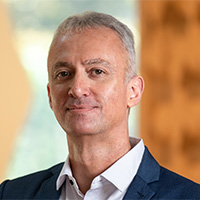
ASPET is pleased to award Dr. Arthur Christopoulos, BPharm, PhD, from Monash University (Australia), the 2024 Louis S. Goodman and Alfred Gilman Award in Receptor Pharmacology. The Louis S. Goodman and Alfred Gilman Award in Receptor Pharmacology was established in 1980 to recognize and stimulate outstanding research in pharmacology of biological receptors. Such research might provide a better understanding of the mechanisms of biological processes and potentially provide the basis for the discovery of drugs useful in the treatment of diseases.
Dr. Christopoulos is receiving this award in recognition of his highly influential studies on the molecular pharmacology of G protein-coupled receptors (GPCRs), particularly for his significant contributions to our understanding of receptor allostery and ligand bias.
Dr. Arthur Christopoulos is Professor of Analytical Pharmacology and a molecular pharmacologist who has made seminal discoveries that revealed allosteric modulation as a universal paradigm of GPCR drug action. His research facilitated identification, quantification and translation of novel first-in-class allosteric modulators and biased agonists for numerous health burdens and transformed the way GPCR medicines are discovered in academia and industry. He has authored over 360 publications, is cited in the leading pharmacological textbooks, is a Clarivate Analytics Highly Cited Researcher in Pharmacology, Toxicology, Biology and Biochemistry, and has been the recipient of some of the highest honors from the Australian, USA, UK and international (IUPHAR) Pharmacological Societies. He has been a proud and generous mentor of over 95 graduates and postdoctoral fellows; many now established field leaders in their own right. In 2017, he was elected to the Australian Academy of Health and Medical Sciences, and in 2021 he was elected to the Australian Academy of Science for his pioneering contributions to pharmacology and drug discovery. Dr. Christopoulos has been a member of ASPET since 1999.
The award will be presented at the Awards Lunch on May 19, 2024, during the ASPET 2024 Annual Meeting in Arlington, Va. Dr. Christopoulos has been invited to give a lecture titled “Hallmarks of GPCR Allostery: Structure, Function and Beyond” during the Online Award Lecture Series. His lecture will be held on Wednesday, April 24 from 4:00 pm - 5:00 pm. Register here for this lecture.
The Otto Krayer Award in Pharmacology
Paul A. Insel, MD, FASPET

ASPET is pleased to award Dr. Paul A. Insel, MD from the University of California, San Diego (UCSD), the 2024 The Otto Krayer Award in Pharmacology. The Otto Krayer Award in Pharmacology commemorates the enduring legacy of Otto Krayer's personal qualities: his ethical behavior, his commitment to teaching, his high standards of scientific scholarship, publication and editorship, his promotion of interdisciplinary research to reveal the actions of drugs or other chemicals, and his guidance and support of younger scientists.
Dr. Insel is receiving this award in recognition of his career research and service contributions to pharmacology and his outstanding mentorship of younger scientists.
Dr. Insel received an MD from the University of Michigan and post-MD training in Internal Medicine at Boston City Hospital/Harvard Medical Service, NIH and in Clinical Pharmacology at the University of California San Francisco (UCSF). He joined the faculty at UCSF and subsequently at UCSD, where he is currently Distinguished Professor of Pharmacology and Medicine and Co-Director of the Medical Science (MD/PhD Training Program (MSTP). Dr. Insel has published 290 original research studies and 180 reviews, chapters and invited articles. His work has provided important insights in several areas, including G-protein-coupled receptors (GPCRs) and post-GPCR signaling (e.g., G-proteins and their effectors, signal transduction mechanisms), signaling compartmentation in caveolae and GPCR expression in health and disease, most recently related to cancer. Dr. Insel served as Program Chair and Secretary-Treasurer of ASPET and as Editor-in-Chief or Senior/Associate Editor of leading journals in pharmacology (including Molecular Pharmacology), physiology and clinical research. He has received major awards from numerous scientific societies (is an ASPET Fellow) and an honorary doctorate from the University of Paris
The award will be presented at the Awards Lunch on May 19, 2024, during the ASPET 2024 Annual Meeting in Arlington, Va. Dr. Insel has been invited to give a lecture titled “Finding A Niche in Pharmacology: Lessons Learned and Advice for Your Future" during the Online Award Lecture Series. This lecture will be held on Wednesday, May 1, 2024, from 12:00 pm - 1:00 pm. Register here for this lecture.
Division-Sponsored Awards
J.H. Woods Early Career Award in Behavioral Pharmacology
Brian D. Kangas, PhD

ASPET is pleased to award Dr. Brian D. Kangas, PhD from the McLean Hospital and Harvard Medical School the 2024 J.H. Woods Early Career Award in Behavioral Pharmacology. The ASPET Division for Behavioral Pharmacology established this award to recognize outstanding original research by early career investigators in the area of behavioral pharmacology.
Dr. Kangas is receiving this award in recognition of his work focusing on the development and empirical validation of animal models and apparatus to assay complex behavioral processes relevant to pain perception, addiction, and neuropsychiatric disorders.
Dr. Brian Kangas is an Assistant Professor of Psychiatry at Harvard Medical School and Director of the Cognition Biology Laboratory at McLean Hospital. He earned his PhD at the University of Florida and then completed a postdoctoral fellowship in the Behavioral Biology Program at McLean Hospital/Harvard Medical School. Dr. Kangas’ research program is supported by the National Institute on Drug Abuse, the National Institute of Mental Health, the biopharmaceutical industry, the Department of Defense, and NASA. Dr. Kangas has been a member of ASPET since 2011.
The award will be presented by the Division for Behavioral Pharmacology on Saturday, May 18, 2024, during the ASPET 2024 Annual Meeting in Arlington, Va.
P.B. Dews Lifetime Achievement Award for Research in Behavioral Pharmacology
Michael Nader, PhD, FASPET

ASPET is pleased to award Dr. Michael Nader, PhD from Wake Forest University School of Medicine the 2024 ASPET P.B. Dews Lifetime Achievement Award for Research in Behavioral Pharmacology.
Dr. Nader is receiving this award in recognition of his productive and innovative research, his teaching and mentoring of students, together with his long-standing service to the field of behavioral pharmacology. The unique scope of his research, emphasizing the interaction of environmental variables on susceptibility to the effects of abused drugs, is in the best tradition of the legacy left us by the many contributions of Dr. Dews.
Throughout Dr. Nader’s exceedingly productive and innovative research efforts, his teaching and mentoring of students, together with his long-standing service to behavioral pharmacology, Mike’s impact on the behavioral pharmacology and of pharmacology more generally has been and will undoubtedly continue to be outstanding. Dr. Nader’s laboratory has focused on the use of non-human primates to study the behavioral pharmacology and neuropharmacology of substances of abuse. His laboratory is unique in that he has focused not only on elucidating the pharmacological actions of a wide range of drugs with demonstrated abuse liability but, additionally, he has addressed experimentally several understudied contextual effects of the role that social and environmental influences play in drug use and abuse. These studies have examined many variables all-too-frequently not examined. For example, his laboratory has studied the relationship of drug use to social status (dominant or subordinate ranks) in individual monkeys, the availability of alternative reinforcing options to the use of abused drugs, the effects of prenatal drug exposure, age, and sex differences to name a few of the variables. The scope and emphasis of his work is unique in revealing the interaction of environmental variables on susceptibility to the effects of abused drugs with this research conducted in the best tradition of the legacy left us by the many contributions of Dr. Dews. The theme of identifying significant environmental variables that influence vulnerability to drug use has been a continuous thread throughout Mike’s extensive research over several decades and follows linearly with several writings of Dr. Dews. Dr. Nader has been a member of ASPET since 1996.
The award will be presented by the Division for Behavioral Pharmacology on Saturday, May 18, 2024, during the ASPET 2024 Annual Meeting in Arlington, Va. Dr. Nader will present a lecture, titled "The Legacy of Peter Dews' Research: Preaching Beyond the Choir," as part of the annual meeting.
Susan Band Horwitz Award Lecture in Cancer Pharmacology
Sharyn D. Baker, BA, PharmD, PhD

ASPET is pleased to award Dr. Sharyn Baker, BA, PharmD, PhD from The Ohio State University, the 2024 Susan Band Horwitz Award Lecture in Cancer Pharmacology. The ASPET Division for Cancer Pharmacology established this award lecture to recognize excellent original research by established investigators in the area of cancer pharmacology. The award is named in honor of Dr. Susan Band Horwitz who is a pioneer in understanding the mechanism of action of cancer chemotherapy drugs many of which have been and remain mainstays of cancer therapy and whose work has changed the nature of cancer treatment.
Dr. Baker is receiving this award in recognition for her pioneering studies combining basic, translational, and clinical research on anticancer drug resistance, dose variability, and dose optimization. As well as her commitment to leading and mentoring the next generation of cancer pharmacologists.
Dr. Sharyn Baker has been a leading investigator in the clinical pharmacology and optimization of cancer therapies in patients over the course of her distinguished career. This has included recognizing physiologic, biochemical and genetic factors that contribute to variability in anticancer drug exposure and response. She has played a pivotal role in understanding resistance mechanisms to tyrosine kinase inhibitors as well as the clinical pharmacology of these drugs in adult and pediatric patient populations. Getting the right drug(s) at the correct dose in each patient defines the concept of precision medicine and Dr. Baker has played a significant role in identifying the pharmacokinetic and pharmacodynamic defining factors critical to this concept in and has been a leading voice in clinical cancer pharmacology over the last two-plus decades. Dr. Baker has been a member of ASPET since 2019.
The award will be presented by the Division for Cancer Pharmacology on Saturday, May 18, 2024, during the ASPET 2024 Annual Meeting in Arlington, Va. Dr. Baker will present a lecture on her work, titled " FLT3 Inhibitor Resistance: Novel Mechanisms and Combinatorial Treatment Strategies" as part of the annual meeting.
Division for Cardiovascular Pharmacology Early Career Award
Matthew Brody, PhD

ASPET is pleased to award Dr. Matthew Brody, PhD from the University of Michigan the 2024 Cardiovascular Pharmacology Early Career Award. The ASPET Division for Cardiovascular Pharmacology Early Career Award has been established to recognize and honor individuals who are working in any area of Cardiovascular Science.
Dr. Brody is receiving this award in recognition of his pathfinding studies on intracellular signaling pathways that promote cardiac hypertrophy and failure, scientific scholarship, and strong commitment to the teaching and mentoring of younger scientists.
Dr. Brody is an Assistant Professor in the Departments of Pharmacology and Internal Medicine at the University of Michigan. He received their B.S. in Environmental Toxicology from the University of California, Davis in 2007 and a PhD in Molecular and Environmental Toxicology from the University of Wisconsin-Madison in 2013, followed by postdoctoral training in the Division of Molecular Cardiovascular Biology at Cincinnati Children’s Hospital before joining faculty at the University of Michigan in 2019. The Brody lab investigates intracellular signaling mechanisms in cardiac hypertrophy and heart failure including functions of post-translational lipid modifications in the compartmentalization, sensing, and transduction of pathogenic signals in cardiomyocytes and the molecular regulation of cardiomyocyte exocytosis and natriuretic peptide release, cytokine receptor signaling, and myocardial oxidative stress in the context of cardiac disease. The Brody lab has a broader interest in identifying and elucidating pharmacological strategies to inhibit intracellular signaling pathways that promote cardiac hypertrophy and failure. Dr. Brody has been a member of ASPET since 2018.
The award will be presented by the Division for Cardiovascular Pharmacology on Saturday, May 18, 2024, during the ASPET 2024 Annual Meeting in Arlington, Va. Dr. Brody will present a lecture on his work titled “Regulation of Cardiomyocyte Signal Transduction and Cardiac Stress Adaptation by Protein Palmitoylation” as part of the annual meeting.
Sarah M. Schumacher, PhD

ASPET is pleased to award Dr. Sarah M. Schumacher, PhD from the Cleveland Clinic the 2024 Cardiovascular Pharmacology Early Career Award. The ASPET Division for Cardiovascular Pharmacology Early Career Award has been established to recognize and honor individuals who are working in any area of Cardiovascular Science.
Dr. Schumacher is receiving this award in recognition of her innovative research on the impact of G protein-couped receptor kinase 2 in cardiac and function interdisciplinary, scientific scholarship, and strong commitment to the teaching and mentoring of younger scientists.
Schumacher began her research career as a graduate student at the University of Michigan, studying atrial myocyte potassium channel trafficking with Jeff Martens, followed by postdoctoral training with Wally Koch at Temple University exploring the domain-specific impact of G protein-couped receptor kinase 2 (GRK2) on cardiac remodeling. Upon recruitment to the Cleveland Clinic as an Assistant Professor of Molecular Medicine, Sarah initially developed her independent research program toward characterizing the impact of targeted expression of GRK2-derived peptides on cardiac function and remodeling during heart failure, which has grown quickly into the investigation of novel mechanisms controlling sex-based responses to cardiac and metabolic stress. Sarah’s outstanding work has been recognized through awards including Melvin Marcus Young Investigator Award, American Heart Association Scientific Sessions 2015, and the Benedict R. Lucchesi Young Scientist Travel Award in Cardiac Pharmacology, ASPET, 2021. Sarah currently serves as a member of the ASPET Cardiovascular Pharmacology Executive Committee. Dr. Schumacher has been a member of ASPET since 2004.
The award will be presented by the Division for Cardiovascular Pharmacology on Saturday, May 18, 2024, during the ASPET 2024 Annual Meeting in Arlington, Va. Dr. Schumacher will present a lecture on her work titled “Cardiac βARKnt As a Tool to Understand Sexual Dimorphism in Cardiometabolism and Heart Failure” as part of the annual meeting.
Division for Cardiovascular Pharmacology Mid-Career Award
Michael Tranter, PhD
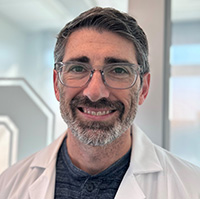
ASPET is pleased to award Dr. Michael Tranter, PhD from The Ohio State University , the 2024 Cardiovascular Pharmacology Mid-Career Award.
Dr. Tranter is receiving this award in recognition of his innovative research that has unraveled molecular mechanisms of posttranscriptional gene regulation that drive cardiometabolic diseases and for his unparalleled commitment to mentoring of younger colleagues.
Dr. Tranter’s research is focused on understanding the molecular mechanisms of post-transcriptional gene regulation that drive cardiometabolic diseases and has been funded by the AHA and NIH. His lab has shown a functional role for the RNA binding protein HuR in the pathophysiology of cardiac remodeling through its actions in both myocytes and fibroblasts. Additionally, his work has made contributions to the field of adipose tissue biology and our understanding of how disruptions in adipose tissue homeostasis impact cardiac physiology. In addition to training three post-doctoral fellows, Dr. Tranter has trained four graduate students, all of whom have obtained AHA or NIH predoctoral fellowships. Dr. Tranter has been an active member of ASPET since 2007, having previously served on the Graduate Recruitment and Education, Science Policy, and the CVP Division Competition Committees.
The award will be presented by the Division for Cardiovascular Pharmacology on Saturday, May 18, 2024, during the ASPET 2024 Annual Meeting in Arlington, Va. Dr. Tranter will present a lecture on his work as part of the annual meeting.
Scientific Achievement Award in Drug Discovery and Development
Zhiqiang An, PhD
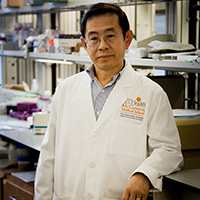
ASPET is pleased to award Dr. Zhiqiang An, PhD from the University of Texas Health Science Center at Houston, the 2024 Scientific Achievement Award in Drug Discovery and Development. The ASPET Division for Drug Discovery and Development established this award to recognize outstanding investigators that have made significant contributions in drug discovery, translational and/or drug development science.
Dr. An is receiving this award in recognition of his extensive and pioneering contributions to antibody drug discovery, both in industry and Academia. His research has contributed to advancing six innovative drug candidates to clinical trials in the last five years for various diseases, including acute myeloid leukemia, cancer bone metastasis, spinal cord injury, and COVID-19.
Dr. Zhiqiang An is Professor and the Robert A. Welch Distinguished University Chair in Chemistry, Director of the Texas Therapeutics Institute, and Vice President of Drug Discovery at the University of Texas Health Science Center at Houston. His laboratory focuses on antibody drug discovery. During the last 10 years, he has advanced six drug candidates to clinical trials for diseases ranging from acute myeloid leukemia (IO-202), cancer bone metastasis (ALMB-0168), solid tumor (IO-108), spinal cord injury (ALMB-0166), COVID-19 (IGM6268), and solid tumor (PRTH-101). Previously, he served as Chief Scientific Officer at Epitomics, Inc. and was Director of Biologics Research at Merck. He has authored over 200 articles, two books, and 23 issued US patents. He is an elected fellow of SIMB, ASM, AAAS, and the National Academy of Inventors (NAI). Dr. An received his Ph.D. degree from the University of Kentucky and his postdoctoral training at the University of Wisconsin-Madison. Dr. An has been a member of ASPET since 2023.
The award will be presented by the Division for Drug Discovery and Development on Saturday, May 18, 2024, during the ASPET 2024 Annual Meeting in Arlington, Va. Dr. An will present a lecture on his work, titled "Academic Drug Discovery: Challenges and Opportunities" as part of the annual meeting.
Bernard B. Brodie Award in Drug Metabolism and Disposition
Edward T. Morgan, PhD

ASPET is pleased to award Dr. Edward T. Morgan, PhD from Emory University, the 2024 Bernard B. Brodie Award in Drug Metabolism and Disposition. The Bernard B. Brodie Award in Drug Metabolism and Disposition has been established to honor the fundamental contributions of Bernard B. Brodie in the field of drug metabolism and disposition. The Award recognizes outstanding original research contributions in drug metabolism and disposition, particularly those having a major impact on future research in the field.
Dr. Morgan is receiving this award in recognition of his long and impactful career studying the regulation of P450 enzymes by inflammatory stimuli, and the underlying mechanisms.
Edward T. (Eddie) Morgan is Professor Emeritus in the Department of Pharmacology and Chemical Biology at Emory University School of Medicine in Atlanta GA. He earned his Ph.D. in Pharmacology from the University of Glasgow. As a Postdoctoral Fellow with Jud Coon at the University of Michigan, Eddie teamed with Dennis Koop to identify, purify and characterize CYP2E1. At the Karolinska Institute, he led a team to demonstrate that expression of sex-specific cytochrome P450s in rodents is determined by the pulsatile pattern of growth hormone secretion. Dr. Morgan has a long career studying the regulation of P450 enzymes by inflammatory stimuli and the underlying mechanisms. His most recent research was focused on developing methods to annotate the human xenobiotic metabolome. He is a former President of ASPET, former Editor of Drug Metabolism and Disposition, and former Associate Editor of Molecular Pharmacology. Dr. Morgan has been a member of ASPET since 1991.
The award will be presented by the Division for Drug Metabolism and Disposition on Saturday, May 18, 2024, during the ASPET 2024 Annual Meeting in Arlington, Va. Dr. Morgan will present a lecture on his work, titled "Shining a Light on Inflammation as a Critical Modulator of Drug Metabolism" as part of the annual meeting.
Division for Drug Metabolism and Disposition James R. Gillette Awards
Yueping Zhang, MD
Asami Toshima, PhD
The James R. Gillette Awards are presented each year by the ASPET Division for Drug Metabolism and Disposition for the best papers published in the ASPET Journal Drug Metabolism and Disposition. Two awards were presented in the areas of Pharmacokinetics/Drug Transporters and Drug Metabolism.
Yueping Zhang, MD, Bristol-Myers Squibb, is the 2023 award recipient in the Pharmacokinetics/Drug Transporters category for the paper titled "Metabolomic Profiling and Drug Interaction Characterization Reveal Riboflavin as a Breast Cancer Resistance Protein–Specific Endogenous Biomarker That Demonstrates Prediction of Transporter Activity In Vivo."
 Asami Toshima, PhD, Pharmacokinetic Research Laboratories, Kyowa Kirin Co., Ltd, is the 2023 award recipient in the Drug Metabolism category for the paper titled "Comprehensive Analyses of the Intracellular and in Vivo Disposition of Fab–Small Interfering RNA Conjugate to Identify Key Issues to Improve Its in Vivo Activity.”
Asami Toshima, PhD, Pharmacokinetic Research Laboratories, Kyowa Kirin Co., Ltd, is the 2023 award recipient in the Drug Metabolism category for the paper titled "Comprehensive Analyses of the Intracellular and in Vivo Disposition of Fab–Small Interfering RNA Conjugate to Identify Key Issues to Improve Its in Vivo Activity.”
The Gillette Awards will be presented by the Division for Drug Metabolism and Disposition on Saturday, May 18, 2024, during the ASPET 2024 Annual Meeting in Arlington, Va., where the awardees will present short talks on their research.
Tao Che, PhD
 ASPET is pleased to award Dr. Tao Che, PhD from Washington University the 2024 Division for Molecular Pharmacology Early Career Award. The ASPET Division for Molecular Pharmacology established this award to recognize scholarly achievements of junior investigators early in their independent careers.
ASPET is pleased to award Dr. Tao Che, PhD from Washington University the 2024 Division for Molecular Pharmacology Early Career Award. The ASPET Division for Molecular Pharmacology established this award to recognize scholarly achievements of junior investigators early in their independent careers.
Dr. Che is receiving this award in recognition his innovative research uncovering the molecular mechanisms underlying opioid receptor signaling and the development of new tools that benefit the field.
Dr. Che is an active member of ASPET and a rising star in molecular pharmacology. Following his extensive postdoctoral training in Structural pharmacology under the tutelage of Professor Bryan Roth, Dr. Che joined the WashU as an Assistant Professor of Anesthesiology in 2020. His research program focuses on understanding the structure and function of GPCRs, in particular, opioid receptors. Dr. Che has made seminarydiscoveries that have markedly contributed to our understanding of the structureand signaling of opioid receptors. His scientific achievements are evidenced by publications in esteemed journals, including Cell (2018), Nature (2023), Nature Communication (2020, 2023,2023), and Nature Structural and Molecular Biology (2022), as an independent investigator. These studies are instrumental in enhancing our understand the opioids’ action, paving the road for designing new generation of opioids with minimal additive properties. In recognition of his research excellence, Dr. Che has received several awards, including the 2019 Toni Shippenberg Young Award. Dr. Che has been a member of ASPET since 2022.
The award will be presented by the Division for Molecular Pharmacology on Saturday, May 18, 2024, during the ASPET 2024 Annual Meeting in Arlington, Va. Dr. Che will present a lecture on his work, titled "Untangling the Complexity of Opioid Receptor Signaling" as part of the annual meeting.
Gregory Sartor, PhD
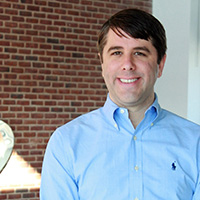
ASPET is pleased to award Dr. Gregory Sartor, PhD from the University of Connecticut, the 2024 Division for Neuropharmacology Early Career Award. The ASPET Division for Neuropharmacology established this award to recognize and honor a young independent investigator working in neuropharmacology
Dr. Sartor is receiving this award in recognition for his innovative research in the field of drug addiction, with emphasis on novel epigenetic targets.
Dr. Sartor is an assistant professor of pharmaceutical sciences at the University of Connecticut. He received his PhD in Neuroscience at the Medical University of South Carolina and completed his postdoctoral training in neuroepigenetics at the University of Miami Miller School of Medicine. A major goal of Dr. Sartor’s research is to develop and test novel pharmacotherapies and delivery systems for the treatment of substance use disorder. In particular, he was first to identify a role for epigenetic reader proteins (BETs) in cocaine-seeking behaviors. More recently, his lab demonstrated that selectively targeting individual BET domains and proteins is a new and effective strategy to reduce cocaine-induced behavioral and transcriptional responses without causing side effects observed with pan-BET inhibitors. In other projects, his lab is developing and testing small molecule and nucleic acid-based approaches to target noncoding RNAs involved in substance use disorders. Dr. Sartor has been a member of ASPET since 2021.
The award will be presented by the Division for Neuropharmacology on Saturday, May 18, 2024, during the ASPET 2024 Annual Meeting in Arlington, Va. Dr. Sartor will present a lecture on his work, titled
"Targeting BET Bromodomains in Substance Use Disorders" as part of the annual meeting.
Lauren Slosky, PhD

ASPET is pleased to award Dr. Lauren Slosky, PhD from the University of Minnesota the 2024 Division for Neuropharmacology Early Career Award. The ASPET Division for Neuropharmacology established this award to recognize and honor a young independent investigator working in neuropharmacology.
Dr. Slosky is receiving this award in recognition of her innovative research on the role of neuropeptide G protein-coupled receptors in addiction and the development of tools for their study.
Dr. Lauren Slosky is an Assistant Professor in the Department of Pharmacology at the University of Minnesota. Dr. Slosky's research is focused on understanding how neuropeptide G protein-coupled receptors regulate addiction-associated behavior and how these receptors can be targeted for therapeutic benefit. She is currently working to identify novel strategies for the treatment of stimulant and opioid addictions, with a focus on the development of allosteric and functionally selective small molecules. Dr. Slosky was awarded a B.S. with honors in Molecular and Cellular Biology and Psychology from The University of Arizona in 2011. She received a Ph.D. in Medical Pharmacology from The University of Arizona in 2015, under the mentorship of Dr. Todd W. Vanderah. Dr. Slosky completed a postdoctoral fellowship in the laboratory of Dr. Marc G. Caron at Duke University and joined the University of Minnesota faculty in 2021. Dr. Slosky has been a member of ASPET since 2012.
The award will be presented by the Division for Neuropharmacology on Saturday, May 18, 2024, during the ASPET 2024 Annual Meeting in Arlington, Va. Dr. Slosky will present a lecture on her work as part of the annual meeting.
Reem T. Atawia, BPharm, MS, PhD
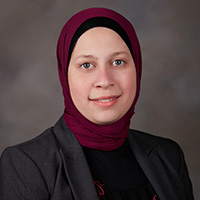
ASPET is pleased to award Dr. Reem T. Atawia, BPharm, MS, PhD from the Southwestern Oklahoma State, the 2024 Pharmacology Educators Early Career Award. The ASPET Division for Pharmacology Education established these awards to promote participation by pharmacology educators in the ASPET Annual Meeting and to foster career development in pharmacology education.
Dr. Atawia is receiving this award in recognition of her significant contributions to delivering Pharmacology education to health professional students.
Reem T. Atawia, PhD, is an Adjunct Assistant Professor of Pharmaceutical Sciences at Southwestern Oklahoma State University and an Assistant Professor of Pharmacology at Ain Shams University, Cairo, Egypt. Dr. Atawia has more than 10 years of experience teaching graduate and undergraduate health professional students. In her role at SWOSU, Dr. Atawia stands out as the instructor and course coordinator of Pharmacology II and Pathophysiology II to second-year pharmacy students covering endocrine, cardiovascular, renal, immunology, oncology, and infectious diseases. She also teaches Toxicology to third-year students. Dr. Atawia completed a 3-year postdoctoral fellowship at Medical College of Georgia, Augusta University (AU), her research was funded by AHA and APS fellowships and focuses on understanding the mechanisms of endothelial dysfunction in cardiometabolic disorders. Dr. Atawia received her PhD in Pharmacology from AU (2019), her MS. in Pharmacology (2014), and B. Pharmacy from ASU (2010). Currently, she is interested in applications of Generative AI in pharmacology education. She has been an ASPET member since 2016, executive officer, ASPET- Division of Pharmacology Education and cardiovascular section and dedicated to serving the community in pharmacology research and education.
The award will be presented during the Division for Pharmacology Education Town Hall.
Grace L. Guo, MBBS, PhD

ASPET is pleased to award Dr. Grace L. Guo, MBBS, PhD from Rutgers University the 2024 Division for Toxicology Career Award. The ASPET Division for Toxicology established this award to recognize outstanding original research contributions to toxicology by an established investigator.
Dr. Guo is receiving this award in recognition of her innovative research and development of new technologies that have led to the discovery of fundamental and transformative concepts regarding the effects of intestine-liver crosstalk on liver metabolism and pathogenesis and an understanding of the underlying molecular mechanisms following disruption of homeostasis of bile acids and exposure to xenobiotic chemicals.
Dr. Guo has dedicated her research career on the molecular mechanisms of regulation of drug metabolism, bile acid signaling and toxicology by nuclear receptors, including FXR, PXR and CAR. She made an important discovery in determining the molecular mechanisms by which xenobiotic nuclear receptors regulate chemical disposition. She is one of the pioneer scientists discovering the importance of intestinal FXR and bile acid signaling in regulating liver functions and disease. Her lab has made several genetically modified mouse models to advance the understanding of human physiology, pathology, pharmacology and toxicology. She has been funded by the NIH and the VA for the last 20 years, published over 140 peer-reviewed papers in pharmacology, toxicology and hepatology journals, mentored many students and fellows, and served on the NIH and VA study sections. Dr. Guo has been actively involved in professional societies to advance the field of toxicology, drug metabolism, and hepatology. This Toxicology Career Award recognizes her research achievement, training of graduate students, and dedicated services to professional societies and research community. Dr. Guo has been a member of ASPET since 2008
The award will be presented by the Division for Toxicology on Saturday, May 18, 2024, during the ASPET 2024 Annual Meeting in Arlington, Va. Dr. Guo will present a lecture on her work as part of the annual meeting.
Shuo Xiao, PhD
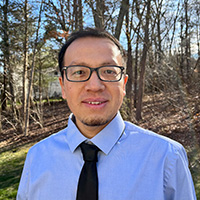
ASPET is pleased to award Dr. Shuo Xiao, PhD from Rutgers University, the 2024 Division for Toxicology Early Career Award. The ASPET Division for Toxicology established this award to recognize excellent original research by early career investigators in the area of toxicology.
Dr. Xiao is receiving this award in recognition for his innovative research and development of new technologies that have led to the discovery of fundamental and transformative concepts regarding female reproductive health through research in biology, emerging environmental toxicology, use of reproductive-tract-on-a-chip technologies as well as new drug development for family planning.
Dr. Shuo Xiao received his PhD in Toxicology from the University of Georgia and completed his postdoctoral training at Northwestern University. He is now an Assistant Professor in the Ernest Mario School of Pharmacy and the Environmental and Occupational Health Sciences Institute at Rutgers University. Dr. Xiao’s research focuses on female reproductive biology, disease, and toxicology, including (1) the side effects of anti-cancer drugs on young female cancer patients’ fertility and developing associated fertility preservation strategy, (2) impacts of emerging endocrine disrupting chemicals on women’s reproductive health, (3) engineering an ovary-on-a-chip and an entire female reproductive system-on-a-chip using microfluidic technology to study reproductive biology, medicine, and toxicology, and (4) development of novel non-hormonal contraceptive drugs targeting ovulation. Dr. Xiao has published over 60 publications in high impact peer-review journals and is very well funded by NIH, NSF, DOD, and other private research foundations. Dr. Xiao has been a member of ASPET since 2022.
The award will be presented by the Division for Toxicology on Saturday, May 18, 2024, during the ASPET 2024 Annual Meeting in Arlington, Va. Dr. Xiao will present a lecture on his work, titled "A Female Reproductive System-On-A-Chip to Study Reproductive Biology, Medicine, and Toxicology" as part of the annual meeting.